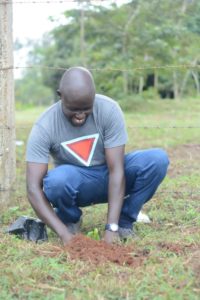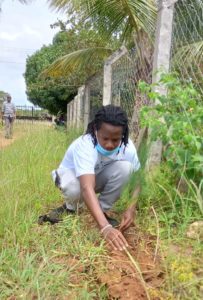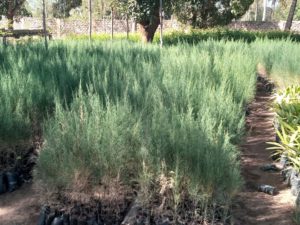Kenya has only an estimated 7.4% forest cover, well under the minimum 10% suggested by the United Nations. Kuvuna, which means “harvest” in Swahili, is a germinating for-profit organization with the goal of changing that statistic.
“Our mission is to empower coastal farmers along the African coastlines,” said Social Innovator Jonathan Kisamwa. With the goal of “better health and better food,” they promote organic farming practices, the planting of indigenous and food-bearing varieties, and the good stewardship of natural resources.
 Four years ago, Jonathan began discussing coconut trees with Social Innovators from Uwepo, a tree-planting project near Jinja, Uganda. After several email chains sharing ideas and questions, Jonathan decided, “we need to do something.” And Kuvuna was born.
Four years ago, Jonathan began discussing coconut trees with Social Innovators from Uwepo, a tree-planting project near Jinja, Uganda. After several email chains sharing ideas and questions, Jonathan decided, “we need to do something.” And Kuvuna was born.
“We began with selling seedlings at a subsidized price and at the same time educating on the importance of replanting trees,” shared Jonathan. “We want to change the mindset of younger generations. We go into the schools, and talk about investing in the land, organic farming, planting trees to reverse deforestation. We’re planting trees with them, even in preschools.”
Kuvuna also launched a project aimed at pastors, who “live literally hand to mouth, yet they have vast pieces of land.”
“We used pastoral seminars and had tree planting courses in the end,” Jonathan explained. “[We] gave them seedlings to plant with the intention of buying back the seeds when the trees grow (usually a year).” These seeds are then pressed for oil, which can be sold for purposes such as organic pesticides.
 Kuvuna has several other projects in the beginning phase, including working with university students and employing women to operate the mill that presses the seeds. Along the way, Kuvuna has received a lot of ideas from Nick and Cheryl, founders of Uwepo. Based near Jinja, Uganda, Uwepo’s mission is to see communities not just surviving, but prospering. “We love it when people can pay their own school fees. When they have enough not just to survive but to give to others,” says Cheryl. They have focused their business on tree planting and market creation, particularly for indigenous solutions in nutrition and food security. Alongside this focus, they provide high-quality internships for youth, proving that farming is not just a “poor man’s job” but a critical community contribution.
Kuvuna has several other projects in the beginning phase, including working with university students and employing women to operate the mill that presses the seeds. Along the way, Kuvuna has received a lot of ideas from Nick and Cheryl, founders of Uwepo. Based near Jinja, Uganda, Uwepo’s mission is to see communities not just surviving, but prospering. “We love it when people can pay their own school fees. When they have enough not just to survive but to give to others,” says Cheryl. They have focused their business on tree planting and market creation, particularly for indigenous solutions in nutrition and food security. Alongside this focus, they provide high-quality internships for youth, proving that farming is not just a “poor man’s job” but a critical community contribution.
Farmers along the Kenyan coastline “are considered lazy, more dependent on tourism,” Jonathan commented. “But we have come to realize it’s due to a lack of knowledge. And COVID came down hard on them. We realized there are a lot of resources [that have] not been utilized.”
Kuvuna was incorporated last in February 2021 as a for-profit company and has three directors who are working together to set the course for all the impact they hope to achieve. As part of Thrive Africa, Loom looks forward to seeing all that Kuvuna can accomplish in bringing “better health and better food” to countless communities, and changing the statistics of deforestation across Kenya.









